优品课件之Unit 20 Humour 教案1
Unit20Humour课件大纲人教版课件.ppt
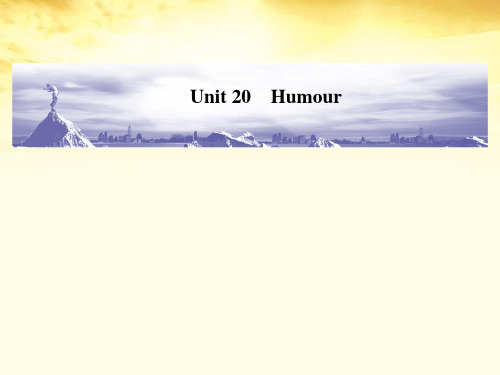
(2)我仔细地看了这篇文章,了解到那是为农村妇女写的。 I looked carefully at the text and realized that it ________________________women in the countryside. 答案: was intended for
certain adj.肯定的;无疑的;某(种) 教材原句P52:Funny plays often have characters that are stereotypes of nationalities or people doing certain jobs.
①Mr Jackson is certain of his success. 杰克逊先生确信自己会成功。 ②We are not certain whether there is a regular bus service along the route.我 们不确定沿这条线路是否有公交班车。 ③It is certain to be healthy and safe for people’s health. 它肯定是健康而安全的。 ④For a certain reason,he didn’t attend the meeting. 因某种原因他没参加会议。
intend vt.打算;计划;意指 教材原句P52:I intend to...
①My girlfriend and I intend to get married next year. 女朋友和我打算明年结婚。 ②I intend Tom to go to the concert with me. 我打算让汤姆跟我一块去听音乐会。 ③I intend that John should go and help them with their work. 我的意思是要约翰去帮助他们工作。
2019-2020年高一英语下册 Unit20 Humour(备课资料)教案 大纲人教版第一册
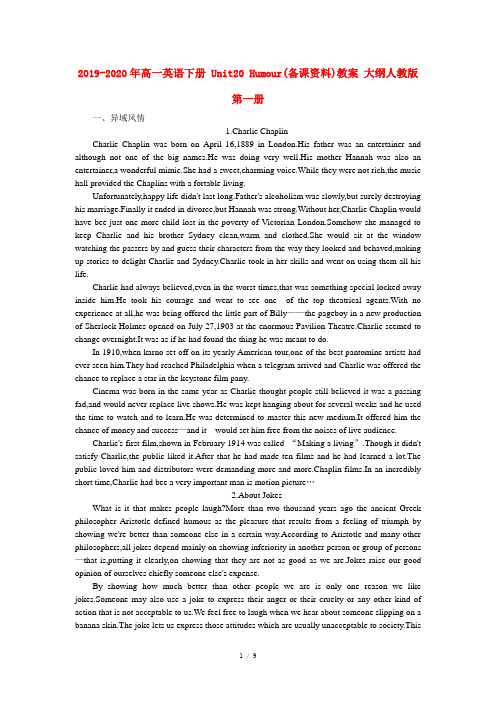
2019-2020年高一英语下册 Unit20 Humour(备课资料)教案大纲人教版第一册一、异域风情1.Charlie ChaplinCharlie Chaplin was born on April 16,1889 in London.His father was an entertainer and although not one of the big names.He was doing very well.His mother Hannah was also an entertainer,a wonderful mimic.She had a sweet,charming voice.While they were not rich,the music hall provided the Chaplins with a fortable living.Unfortunately,happy life didn't last long.Father's alcoholism was slowly,but surely destroying his marriage.Finally it ended in divorce,but Hannah was strong.Without her,Charlie Chaplin would have bee just one more child lost in the poverty of Victorian London.Somehow she managed to keep Charlie and his brother Sydney clean,warm and clothed.She would sit at the window watching the passers-by and guess their characters from the way they looked and behaved,making up stories to delight Charlie and Sydney.Charlie took in her skills and went on using them all his life.Charlie had always believed,even in the worst times,that was something special locked away inside him.He took his courage and went to see one of the top theatrical agents.With no experience at all,he was being offered the little part of Billy——the pageboy in a new production of Sherlock Holmes opened on July 27,1903 at the enormous Pavilion Theatre.Charlie seemed to change overnight.It was as if he had found the thing he was meant to do.In 1910,when karno set off on its yearly American tour,one of the best pantomine artists had ever seen him.They had reached Philadelphia when a telegram arrived and Charlie was offered the chance to replace a star in the keystone film pany.Cinema was born in the same year as Charlie thought people still believed it was a passing fad,and would never replace live shows.He was kept hanging about for several weeks and he used the time to watch and to learn.He was determined to master this new medium.It offered him the chance of money and success—and it would set him free from the noises of live audience.Charlie's first film,shown in February 1914 was called “Making a living”.Though it didn't satisfy Charlie,the public liked it.After that he had made ten films and he had learned a lot.The public loved him and distributors were demanding more and more.Chaplin films.In an incredibly short time,Charlie had bee a very important man is motion picture…2.About JokesWhat is it that makes people laugh?More than two thousand years ago the ancient Greek philosopher Aristotle defined humous as the pleasure that results from a feeling of triumph by showing we're better than someone else in a certain way.According to Aristotle and many other philosophers,all jokes depend mainly on showing inferiority in another person or group of persons —that is,putting it clearly,on showing that they are not as good as we are.Jokes raise our good opinion of ourselves chiefly someone else's expense.By showing how much better than other people we are is only one reason we like jokes.Someone may also use a joke to express their anger or their cruelty or any other kind of action that is not acceptable to us.We feel free to laugh when we hear about someone slipping on a banana skin.The joke lets us express those attitudes which are usually unacceptable to society.Thisis probably the reason why some of the jokes,especially those involving cruelty or sex,are so poplular with certain people.In addition,all jokes depend on our enjoy ment of laughing at something that is strange and out of place because it's different from things which are happening around it.The same situation can be either sad or pleasant,depending entirely on how strange and out of place it is.If a girl in a bathing-dress falls into a swimming pool,we don't laugh because nothing unusual has happened.But if a man in smart suit falls in,the situation is at once unusual in a pleasant way and we laugh.A good joke-teller will always try to build up a situation in which one thing is expected until something unexpected suddenly happdened,and so we laugh.二、知识归纳(一)with的用法归纳(1)表示“和……一起”。
UNIT 20 HUMOUR教案

“幽默”是英语国家文化的一个重要内核,也是这一文化的一个显著标识。
中国学生从开始学习英语时起(小学或初中),就在接受“幽默”的潜移默化的影响。
这一话题能够激发学生的学习兴趣,同时也符合他们的年龄特征,这是因为:1、这个年龄段的学生渴望了解世界,他们对异国文化具有强烈的好奇心,乐意学习和了解关于异国文化的内容;2、通过几年的英语学习、阅读报纸杂志等等,学生对英语国家文化中的“幽默”已有一些认识;3、中国文化博大精深,其中包含着丰富的幽默元素,学生从本国文化中叶汲取了一些幽默的营养。
可以肯定地说,这个单元的话题是“老师愿意教,学生乐意学”。
下面我分为六个课时讲讲本单元的教学。
第一课时听力二、教学目标(2)语言技能:训练学生的下列口语技能:1)正确、清楚、响亮地发好单词的元音;2)按意群、有节奏地说句子。
同时训练学生下列听力理解能力:1)注意力分配能力:眼耳并用,同时观察图片信息和听懂文字信息;2)信息预测能力:能根据所提供的图片信息预测故事的发展并在听的过程中不断证实、修改预测和作出新的预测;3)抓故事主要线索的能力:能将注意力始终放在故事的主线上、理解大意;4)捕捉特定信息的能力:能有选择性地将注意力指向特定信息;5)准确地听写相关词语的能力:能听懂并写下特定的词语(如交待故事发展的动词等)。
三、教学重点、难点本节课的教学重点是训练学生的听力理解能力。
难点是在听力理解的基础上,如何比较流畅地说和写。
四、课时结构(按45分钟计)为达成上述教学目标、教学重点和难点,根据材料特点和学生实际,本课时时间分配如下:热身10分钟,听力20分钟,说7分钟,写8分钟。
五、教学方法和手段采取听说法、听写法、竞赛法、交际法、合作学习法等。
多媒体教学(录音机,幻灯片)。
六、教学流程3、竞说英语绕口令:为提高学生说好英语绕口令的积极性,增强他们说英语的信心,举行一个小型的竞赛活动。
老师充当组织者、评价者的角色。
通过“竞说英语绕口令”这项活动,检验和评价了学生“学说英语绕口令”的学习活动,提高了他们的学习兴趣和口语水平,同时浓厚了课堂气氛。
Unit 20 Humour 教案1
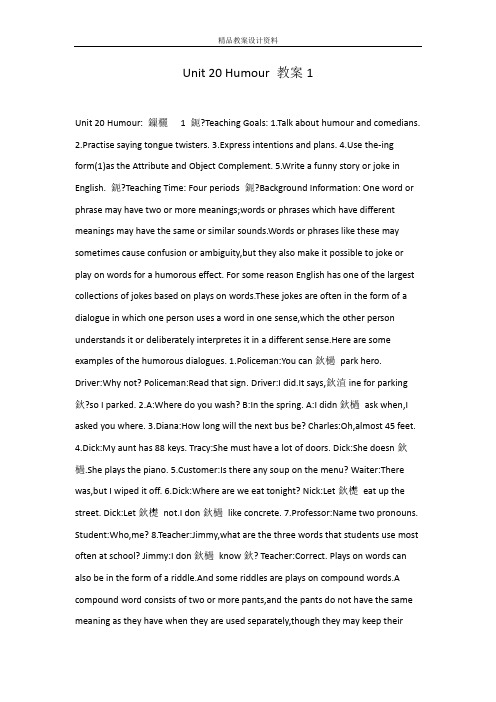
Unit 20 Humour 教案1Unit 20 Humour: 1 鈪?Teaching Goals: 1.Talk about humour and comedians.2.Practise saying tongue twisters.3.Express intentions and plans.e the-ingform(1)as the Attribute and Object Complement. 5.Write a funny story or joke in English. 鈪?Teaching Time: Four periods 鈪?Background Information: One word or phrase may have two or more meanings;words or phrases which have different meanings may have the same or similar sounds.Words or phrases like these may sometimes cause confusion or ambiguity,but they also make it possible to joke or play on words for a humorous effect. For some reason English has one of the largest collections of jokes based on plays on words.These jokes are often in the form of a dialogue in which one person uses a word in one sense,which the other person understands it or deliberately interpretes it in a different sense.Here are some examples of the humorous dialogues. 1.Policeman:You can鈥檛park hero. Driver:Why not? Policeman:Read that sign. Driver:I did.It says,鈥淔ine for parking 鈥?so I parked. 2.A:Where do you wash? B:In the spring. A:I didn鈥檛ask when,I asked you where. 3.Diana:How long will the next bus be? Charles:Oh,almost 45 feet.4.Dick:My aunt has 88 keys. Tracy:She must have a lot of doors. Dick:She doesn鈥檛.She plays the piano.5.Customer:Is there any soup on the menu? Waiter:There was,but I wiped it off.6.Dick:Where are we eat tonight? Nick:Let鈥檚eat up the street. Dick:Let鈥檚not.I don鈥檛like concrete.7.Professor:Name two pronouns. Student:Who,me?8.Teacher:Jimmy,what are the three words that students use most often at school? Jimmy:I don鈥檛know鈥? Teacher:Correct. Plays on words can also be in the form of a riddle.And some riddles are plays on compound words.A compound word consists of two or more pants,and the pants do not have the same meaning as they have when they are used separately,though they may keep theiroriginal sound.Here are some examples: (1)I work only when I鈥檓fired.What am I ?(A rocket.) (2)I have teeth,but no mouth.What am I?(A comb.) (3)I have a mouth,but no teeth,what am I?(A river.) (4)Why does a river sleep a lot?(Because it is always in a bed.) (5)Why does a river have a lot of money?(Because it has two banks.)(6)If you throw a white stone into Red Sea,what will it become?(Wet.) (7)What can you see with your eyes shut?(A dream.) (8)Which runs faster,heat orcold?Why?(Heat.Because you can catch cold.) (9)I have cities but no houses;forests but no trees;rivers without water.What am I?(A map.) (10)What letter are people the most afraid of?(E.Because it鈥檚the end of 鈥渓ife鈥?) (11)What kind of driver never needs a license?(A screwdriver.) (12)What kind of a nail should you not hit with a hammer?(Your fingernail.) Some jokes are based on words which have the same sound but different meanings and spellings.Jokes of this kind is better heard,not seen.When they are written or printed,the humor is largely lost.For example: Seven days without water makes one weak (week). We must all hang together or we shall all hang separately. The First Period Teaching Aims: 1.Practise saying tongue twisters.2.Do some listening.3.Talk about intentions and plans.4.Learn and master the new words and expressions of this part. Teaching Important Points: 1.Improve the students' listening ability by listening. 2.Improve the students' speaking ability by making up dialogues. 3.Let the students master how to impress their intentions and plans. Teaching Difficult Points: 1.Make dialogues to express their ideas. 2.Say tongue twisters fluently. Teaching Methods: 1.Listening and speaking methods to improve the students' listening and speaking ability. 2.Pair work or group work to make every student active in class activities. Teaching Aids: 1.a tape recorder 2.a projector and some slides 3.a computer for multimedia use Teaching Procedures: Step鈪?Greetings and Revision T:Good morning,everyone. Ss:Good morning,teacher. T:Sit down,please.In the last period,I told you to make sentences with the expressions of Unit 19 and say them in groups.In this period,I'll ask some students to say theirsentences again before class.Please listen to them carefully.Wang Fei,read your sentences,please. (Students listen carefully and help to correct the mistakes.) Step 鈪?Preparation for Listening and Speaking T:Today,we're going to learn a new unit Unit 20,Humour.(Teacher writes the following on the blackboard:Unit 20,Humour,the First Period.)From the title,we can guess that this unit will be much more interesting,for every one of us likes fun,and every fun makes us happy and gay.I hope you'll be interested in this unit.First,let's learn the new words and expressions of this period.Look at the screen. (Teacher shows the screen.) New words and expressions twister n.?tongue twister缁曞彛浠?bitter adj.鑻︾殑锛岀棝鑻︾殑couple n.(涓€)瀵癸紱(涓€)minister n.閮ㄩ暱锛屽ぇ鑷?humour n.(=humor)骞介粯锛岃瘷璋?humourous adj.瀵屽菇榛樻劅鐨勶紝婊戠ń鐨?mostly adv.ч儴鍒嗭紝閫氬父laughter n.绗戯紝绗戝0tear n.鐪兼唱circus n.?鍦?锛涙潅鎶€鍥?鍦? clown n.灏忎笐锛岀矖椴佹剼锠㈢殑浜?intend vt.intention n.鎰忓浘锛岀洰鐨?Fred 浣涚憺寰?鐢峰悕) T锛歀ook at the first word:twister.Read after me:鈥渢wister鈥?(Read it twice),tongue twister鈥?Do you know tongue twister?It means鈥渁word or phrase difficult to speak quickly or correctly鈥?such as in Chinese锛屼笉鍚愯憽钀勭毊鈥?In English,there are many twisters,too.In a while,let's read them.鈥?(Teacher gives brief explanations to other words if necessary.) Step鈪?Warming up T:Please open your books and turn to Page 39.Look at Warming up.Let's practise saying the following tongue twisters.First,read it slowly.Then read them faster and faster.You can read them to your partner.And let your partner see if there is any mistake in your reading.At last,I'll ask five students to read them before class to see who can speak faster without making mistakes,OK?let's begin. Step鈪?Listening T:So much for warming up.Now we'll do listening.In the next period of time you will hear an interesting story.It is about a couple who got married.A child isasking her grandmother about her marriage.Number the pictures in the proper order.The first one has been done to help you.Please read the other two requirements to see what you will have to do after you finish listening.(After a few minutes.)Do you know about the things you'll do?(Ss:Yes.)During the period when you listen to the tape,I'll play it three times in all.When I play it for the first time,just listen.When I play it for the second time,do the exercises and you can check your answers to make sure they are right when I play the tape for the third time.Then check your answers with your classmates and tell your partner the story.Note thatthe beginning of the story has been given to you on Page 39.(At last,the teacher shows the pictures in the right order and the answers of Part 2 on the screen to getall the students to check and then asks a student to tell the story to the whole class.) Step 鈪?Speaking T:Now let's do speaking.First,please read a dialogue between a journalist(j)and a comedian(c). T:(After students read the dialogue)What's the most important thing in a comedian's job? SA:The important thing in a comedian's job is not only to make people laugh,but also to get them to think about life. T:How many ways to make people laugh are given?What are they?What other examples can you give? SB:Two ways are given.They are:Jokes about speaking a foreign language and the way someone walks and talks.Other examples are:their make-up, the styles of their clothes,shoes and the way they hear something or see something etc. T:Please make a dialogue yourself.Pair work.One acts as the part of a journalist(j)and your partner acts as a circus clown(c).The dialogue you make should include the questions on Page 40.And you can use the expressions on the screen to help you.(Show the screen.)Later,we'll ask one pair to give us a performance.Let's begin. Useful expressions: I will鈥︺€€I'm going to鈥?I intend to 鈥?I hope to鈥?I plan/want to鈥?I wish to鈥?I've decided(not)to鈥?I hope not to鈥?Sample dialogue: J:For which age do you write your show? C:I mainly write my show for children.They're very interested in it.But a lot of adults like my show,too. J:What do you do as a clown?C:To make people laugh:We often don't use any words.It is our clothes,make-up and way we act that make people laugh.People laugh and they forget their problems for at least a moment. J:What are you doing at this moment? C:I'm getting ready for a performance with my partner.It's the funnest I've ever shown. J:What are your plans for your next show? C:I've written several shows.I intend to do them in the next few weeks.I hope to act them during the christmas holiday. J:How do you make children laugh? C:I make them laugh by movements.I copy Charlie Chaplin's movements in my performance.Childern laugh with tears. J:When will you stop working as a clown? C:As long as people especially children like me,I want to go on working until I'm very old.I like my job very much. J:Thank you very much. Step 鈪?Consolidation T:Now make another dialogue with your partner,using the expressions on the screen. Sample dialogue. (A:a journalist;B:a director) A:What are you doing at present?B:We're doing a comedy.It's really funny. A:What's your plan for the future? B:I've decided to do an opera.I would like to have a try in the opera. A:I hope it will be very successful.By the way,what do you enjoy doing most of all? B:Er鈥?it's a bit hard to say.I always intend to try something new. Step 鈪?Summary and Homework T:In this class,we've practised some tongue twisters and listened to a story.Then we've done some speaking practice.Above all,we should remember the useful expressions about how to express intentions and plans.What are they?They are鈥?The Design of the Writing on the Bb.Teacher and students say them aloud together.)Today's homework:1.Collect as many tongue twisters as possible;2.Make dialogues after class according to the situations given on the screen.(Teacher shows the screen.)That's all for this class.Class is over. Situation 1:This weekend you intend to see a film/watch a football match/visit a friend or some relatives.Or you plan to go shopping/go fishing/go sightseeing/go mountain-climbing etc. Situation 2:Suppose you have some special plans for New Year or for the winter holidays.You'd like to talk about it with your friend. Sample dialogues: Dialogue 1. A:Any plans for the weekend? B:I intendto go to the country to visit my grandparents. A:Your grandparents live a bit far away,don't they? B:Yes.It takes about two hours by bus. A:Are you going there alone? B:No.Since we haven't seen my grandparents for a long time,my parents and my uncle's family will go there together. A:So there would be a large family get-together this weekend.I think your grandparents will certainly be very happy! B:Of course they will. Dialogue 2: A:How do you plan to celebrate New Year,B? B:We have decided to give a comedy at New Year's party. A:Are you all ready for it? B:Not yet.But the play and the actors have been chosen.We are busy memorizing the lines of our own parts.Then we will practise where to stand,where to move,entrances and exits.I believe it will be terrific. A:I hope it will be a great success. Step 鈪?The Design of the Writing on the Blackboard Unit 20銆€Humour The First Period Useful expressions: I will鈥?I'm going to鈥?I intend to鈥?I hope to鈥?I plan/want to鈥?I wish to鈥?I've decided(not)to鈥?I hope to鈥?Step 鈪?Record after Teaching______________________________ ____________________________________________________________ ______________________________。
Unit 20 Humour- 上课学习上课学习教案2_1

Unit 20 Humour: 教案2Unit20Humour:教案2Period1明确目标.Practicesayingsometonguetwisters.2.Listenandnumberthepictures.Thenanswerthequestions accordingtowhatthestudentshear.整体感知Step1PresentationEveryonewantsandneeds,tolearnhowtospeakwellifwecant alkfluentlyandhumorously,wefeelwehavefriendlyconver sation.Todaywewilllearntosaysometonguetwistersandta lkaboutthepicturesonthebook.教学过程Step2Gothroughthetwistersonthebookandaskstudentstofollow.Step3 Dealwiththepointsandtalkabouttheskillsofspeaking.Step4Practicethetonguetwistersinpairsandthenactthemout.Askthestudentstolistenandmember,andthentalkaboutthe picturesonthebook.总结,扩展Step5Dotheexercisesafterthepicturesandthenpracticethem.m akeupshortdialoguesaccordingtothequestions.(五)随堂练习.你在车上吸烟,售票员对你说:“Smokingisn'tallowedhere”。
你应该说_______.A.Don’tworry.B.Ididn’tknowthat.c.Excuseme.D.oh,sorry.2.在车站上,一位老人对你说mayIaskyoutobuyaticketforme”你应该说_______.A.canIhaveabookatthewatchB.youarewelcome.c.I'llbegladtodoit.D.Idon'tthinkIcan.3.你站在柜台前,售货员对你说:“mayIhelpyou?”你说:_______:A.canIhavealookatthewatch?B.yes,youmay.c.Thewatch,please.D.It’skindofyoutohelpme.4.你那者报纸,有人问你"Anythinginterestinginthepapers?你应该说:_____A.Nothingspecial.B.Veryinteresting.c.IhavenonewspapersD:I'aminterested5.今天是元旦,以为朋友对你说"happynewyear"你应该怎么说:_______.A.TheNew-year’sin.B.Thesametoyou.c.Iwishyouhealth.D.manyhappyreturns!.D2.c3.A4.A5.BPeriod2明确目标.Lean)tointerviewaperson.2.TotraintheabilitiesoftalkinginEnglish.3.Tolearnsomeusefulexpressionsintheinterviewing.整体感知StepIPresentationTodaywearegoingtolearnhowtointerviewsomebody.Givean exampletothestudentsbyaskinganexcellentstudenttohel p.教学过程Getthestudentstoreadandpracticethedialogueinthetext.Step2workinpairsAskonestudentplaythepartofajournalisttheotheracircu sdown.makeupadialoguereferringtothequestionsandpict ures.Step3practice Practicetheusefulexpressionsinpairsfirst,andthenactoutatclassusingdialoguesormakingsentences.Step4Playthetapeforthestudentstolistenandfollow.Step5Doalittlequizbyspeaking..----johnsendshisbestwishes.----________.A.That’sniceofhimB.oh,heistoopolicec.It’skindofhimtosaysoD.youarereallykindtome2.----whatdoyouthinksallyislike?----She______A.isn'tingoodhealthB.doesn’t’likeeatingtoomuchc.likestoeatfishD.isverypretty3.----Doyoumindmytakingthisseat?----_______A.yes,sitdownpleaseB.No,ofcoursenotc.yes,takeitpleaseD.No,youcan'ttakeit4.-----Leavingforchicago?------_______.A.SoontelyteD.Sooner5.-------Excuseme,haveyougotalight? ______.Idon’tsmoke.A.Don’tmentionB.Nevermindc.I'mafraidnotD.Thanksalot.A2.D3.B4.A5.cPeriod3(一)明确目标.Getthestudentstoknowaboutcomediesandhumor.2.Getthestudentstoknowmoreaboutthefunnyplays.(二)整体感知Step1PresentationQuestions:Doyouknowsomecomedians?Doyouknowsomecomedyplays?Todaywearegoingtoreadatextaboutlanguagematter.Step2Lookatthephotosandtalkaboutthem,thenanswerthequesti onsonthebook.(三)教学过程Step3Readthetextmorecarefullyandthendothepost-readingexe rcisesonthebook.Step4Dealwiththelanguagepoints.Step5Playthetapeforthestudentstolistenandfollow,andthena skthestudentstofindoutthemainideaofeachpartofthetex t.(四)总结、扩展Step6Doexercises3choosethebestverbtocompleteeachsentence usingthecorrectform.Referringtopage55.(五)随堂练习.wesendouttheinvitationcardsquiteearly,butquite fewpeopledidn’tturnupattheparty.ABcD2.Thoughhehasbeendeadformanyyears,westillthinkthatd eathisheavierthanmountTai.AcD3.Thepriceofthefruitandvegetableswerealittlelowerth enwehadexpected.ABcD4.Theharderyou'11practice,thegreaterprogressyouwill make.ABcD5.Theseshoesarethelessexpensiveofall.ABc参考答案.B2.D3.A4.B5.cPeriod4明确目标.Getthestudentstoreadsomeextramaterialsanddiscu sssomequestions.2.GetthestudentstowriteashortstoryonajokeinEnglish.3.Revisethelanguagepointsandgrammarknowledgeinthisu nit.(二)整体感知Step1Presentationcanyouknowhowtobepolite?canyouknowhowtoobeythetraff icroles?Todaywearegoingtoreadatext"we'vealreadymet, haven’twe?"Step2Readthetextandfinishtheexerciseafterit.(三)教学过程Step3Afterfinishingalltheexaminesafterthetext,thenaskthe studentswriteashortfunnystoryorajokeinEnglishatclas s.Step4Revisethecontentsoftheunit.I.语言要点l.lookon...as把…..看作Doyoulookonhimasanauthorityonthesubject'?你认为他是这问题的权威吗?2.mosfiy主要地,大部分,相当于formostpart,inmostcases,almostall,chiefly等意。
Unit 20 Humour课件

6
A
5
B
4
C
Ask her to marry him
have an idea in his head
Talk about marriage
3Байду номын сангаас
feel surprised
D
1
They meet in some place
E
2
Have dinner
F
Listening
What was the man’s job? He was a minister in the church. In England, who can marry couples in church? A minister. How close to each other did the man and the woman live? About eight kilometers from each other.
write your show? 2. What do you do as a clown? 3.How do you make children laugh? 4. what are your plans for your next show? 5.When will you stop working as a clown?
Here is sample.
an
interview
J:Hello.I’m a journalist from china Daily. May I ask you some questions? C: Sure. J: Is your performance successful tonight? C: Yes. J: How long have you been a Clown? C:8 years. …………….. ……………. J:I’m so glad you accepted my interview. And I hope your show in china will be more popular. C: Thanks a lot.
Unit20Humor(人教版高一英语下册教案教学设计)
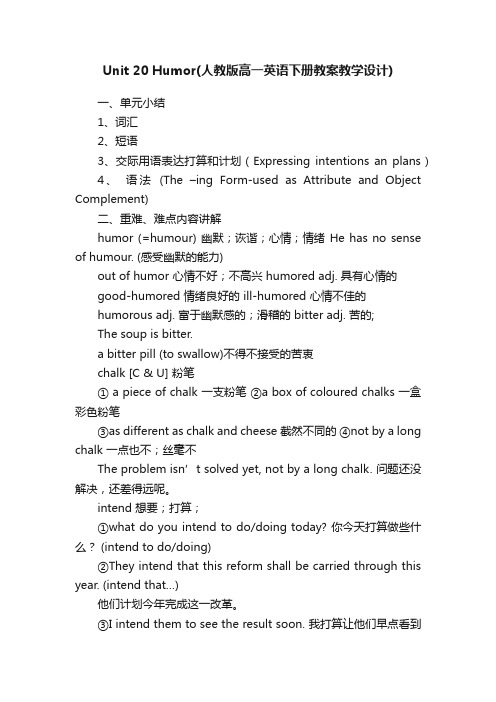
Unit 20 Humor(人教版高一英语下册教案教学设计)一、单元小结1、词汇2、短语3、交际用语表达打算和计划(Expressing intentions an plans)4、语法(The –ing Form-used as Attribute and Object Complement)二、重难、难点内容讲解humor (=humour) 幽默;诙谐;心情;情绪 He has no sense of humour. (感受幽默的能力)out of humor 心情不好;不高兴 humored adj. 具有心情的good-humored 情绪良好的 ill-humored 心情不佳的humorous adj. 富于幽默感的;滑稽的 bitter adj. 苦的;The soup is bitter.a bitter pill (to swallow)不得不接受的苦衷chalk [C & U] 粉笔① a piece of cha lk 一支粉笔②a box of coloured chalks 一盒彩色粉笔③as different as chalk and cheese 截然不同的④not by a long chalk 一点也不;丝毫不The problem isn’t solved yet, not by a long chalk. 问题还没解决,还差得远呢。
intend 想要;打算;①what do you intend to do/doing today? 你今天打算做些什么? (intend to do/doing)②They intend that this reform shall be carried through this year. (intend that…)他们计划今年完成这一改革。
③I intend them to see the result soon. 我打算让他们早点看到结果。
高一英语教案:Unit20Humour

Unit 20Humour
第1课时课型New
教学目的:Students are asked
a.to lear n some new words and expressi on
b.to study the Ian guage point
c.to deal with Warming up
重点:
To thi nk about what facial expressi ons mea n and how we in terpret them
I thought I thought
7.She sells seashells by the seashore. The shells she sells are surely
seashells. So if she sells shells on the seashore, I'm sure she sells seashore shells.
难点:
To thi nk about what facial expressi ons mea n and how we in terpret them
教学方法:
Five-step methods
教具(试验器材)
Multi-in strume ntsa tape record
板书设计:
Unit20Humour
3If white chalk chalks white on a blackboard, will black chalk chalk black on a white
4How many cans can a canner can if a canner can can cans? A canner can can as many cans as a canner can if a canner can can cans.
优品课件之Unit 20 Humour

Unit 20 HumourUnit 20 Humour I..Teaching Goals: 1.Talk about humour and comedians. 2.Practise saying tongue twisters. 3.Express intentions and plans. e the-ing form (1) as the Attribute and Object Complement. 5.Write a funny story or joke in English. Ⅱ.Teaching Time: Four periods The First Period Teaching Aims: 1.Practise saying tongue twisters. 2.Do some listening. 3.Talk about intentions and plans. 4.Learn and master the new words and expressions of this part. Teaching Important Points:1.Improve the students' listening ability by listening.2.Improve the students' speaking ability by making up dialogues.3.Let the students master how to impress their intentions and plans. Teaching Difficult Points: 1.Make dialogues to express their ideas. 2.Say tongue twisters fluently. Teaching Methods: 1.Listening and speaking methods to improve the students' listening and speaking ability. 2.Pair work or group work to make every student active in class activities. Teaching Aids: 1.a tape recorder 2.a projector and some slides 3.a computer for multimedia use Teaching Procedures: Step Ⅰ.Greetings and Revision T:Good morning, everyone. Ss:Good morning, teacher. T:Sit down,please.In the last period,I told you to make sentences with the expressions of Unit 19 and say them in groups.In this period,I'll ask some students to say their sentences again before class.Please listen to them carefully.Wang Fei,read your sentences,please. StepⅡ.Preparation for Listening and Speaking T:Today,we're going to learn a new unit Unit 20,Humour.(Teacher writes the following on the blackboard:Unit 20,Humour,the First Period.)From the title,we can guess that this unit will be much more interesting,for every one of us likes fun,and every fun makes us happy and gay.I hope you'll be interested in thisunit.First,let's learn the new words and expressions of this period.Look at the screen. T:Look at the firstword:twister.Read after me:“twister”.(Read it twice),tongue twister….Do you know tongue twister?It means“a word or phrase difficult to speak quickly or corr ectly”.such as in Chinese“吃葡萄,吐葡萄皮,不吃葡萄,不吐葡萄皮”.In English,there are many twisters,too.In a while,let's read them.… (Teacher gives brief explanations to other words if necessary.) Step Ⅲ.Warming up T:Please open your books and turn to Page 39.Look at Warming up.Let's practise saying the following tongue twisters.First,read it slowly.Then read them faster and faster.You can read them to your partner.And let your partner see if there is any mistake in your reading.At last,I'll ask five students to read them before class to see who can speak faster without making mistakes,OK?let's begin. StepⅣ.Listening T:So much for warming up.Now we'll do listening.In the next period of time you will hear an interesting story.It is about a couple who got married.A child is asking her grandmother about her marriage.Number the pictures in the proper order.The first one has been done to help you.Please read the other two requirements to see what you will have to do after you finish listening.(After a few minutes.)Do you know about the things you'll do?(Ss:Yes.)During the period when you listen to the tape,I'll play it three times in all.When I play it for the first time,just listen.When I play it for the second time,do the exercises and you can check your answers to make sure they are right when I play the tape for the third time.Then check your answers with your classmates and tell your partner the story.Note that the beginning of the story has been given to you on Page 39.(At last,the teacher shows the pictures in the right order and the answers of Part 2 on the screen to get allthe students to check and then asks a student to tell the story to the whole class.) Step Ⅴ.Speaking T:Now let's do speaking.First,please read a dialogue between ajournalist(j)and a comedian(c). T:(After students read the dialogue)What's the most important thing in a comedian's job? SA:The important thing in a comedian's job is not only to make people laugh,but also to get them to think about life. T:How many ways to make people laugh are given?What are they?What other examples can you give? SB:Two ways are given.They are:Jokes about speaking a foreign language and the way someone walks and talks.Other examples are:their make-up, the styles of their clothes,shoes and the way they hear something or see something etc. T:Please make a dialogue yourself.Pair work.One acts as the part of a journalist(j)and your partner acts as a circus clown(c).The dialogue you make should include the questions on Page 40.And you can use the expressions on the screen to help you.(Show the screen.)Later,we'll ask one pair to give us a performance.Let's begin. Useful expressions: I will…I'm going to… I intend to … I hope to… I plan/want to… I wish to… I've decided(not)to… I hope not to… Sample dialogue: J:For which age do you write your show? C:I mainly write my show for children.They're very interested in it.But a lot of adults like my show,too. J:What do you do as a clown? C:To make people laugh:We often don't use any words.It is our clothes,make-up and way we act that make people laugh.People laugh and they forget their problems for at least a moment. J:What are you doing at this moment? C:I'm getting ready for a performance with my partner.It's the funnest I've ever shown. J:What are your plans for your next show? C:I've written several shows.I intend to do them in the next few weeks.I hope to act them during the christmas holiday. J:How do you make childrenlaugh? C:I make them laugh by movements.I copy Charlie Chaplin's movements in my performance.Childern laugh with tears. J:When will you stop working as a clown? C:As long as people especially children like me,I want to go on working until I'm very old.I like my job very much. J:Thank you very much. Step Ⅶ.Summary and Homework T:In this class,we've practised some tongue twisters and listened to a story.Then we've done some speaking practice.Above all,we should remember the useful expressions about how to express intentions and plans.What are they?They are…(The Design of the Writing on the Bb.Teacher and students say them aloud together.)Today's homework:1.Collect as many tongue twisters as possible;2.Make dialogues after class according to the situations given on the screen.(Teacher shows the screen.)That's all for this class.Class is over. Situation 1:This weekend you intend to see a film/watch a football match/visit a friend or some relatives.Or you plan to go shopping/go fishing/go sightseeing/go mountain-climbing etc. Situation 2:Suppose you have some special plans for New Year or for the winter holidays.You'd like to talk about it with your friend. The Second Period Teaching Aims: 1.Learn and master the new words and expressions of the text. 2.Learn something about comedy,clown and comedian,especially about crosstalk show. 3.Improve the students' reading ability by reading the text. Teaching Important Points: 1.How to master the new words and expressions of the text. 2.How to improve the students' reading and writing ability. Teaching Difficult Point: How to get the students to grasp the main idea of a passage as soon as possible. Teaching Methods: 1.Fast reading to improve the students' reading ability. 2.Pair work or group work to get every student active in class. 3.Inductive method to make the students understand the text better. Teaching Aids:1.a recorder2.a projector and some slides3.a computer for multimedia use Teaching Procedures: step Ⅰ.Greetings and Revision Greet the whole class as usual.Teacher checks the students' homework. step Ⅱ.Preparation for readingT:Now,please turn to Page 114.Let's learn the new words and expressions together.First read them by yourselves. T:(After the students finish reading.)Who will read the new words and expressions for us? SA:(Standing up)I'll try.(SA begins to read.)(After the student finishes reading teacher points out the students' mistakes in pronunciation and stress if there is any.Then teacher plays the tape-recorder to let the students listen and follow.) T:So much for the new words and expressions.Please turn to Page 40 and read the instructions in Pre-reading.Have a discussion with your partner and make preparations for the questions.(Teacher shows the pictures on the screen.After five minutes.) T:Are you ready?(Ss:Yes,we are ready.)Look at the photos.Do you know who the first comedian is? SB:He is Chaplin and he was born in Britain.He began to act when he was five.When he was seventeen,he went to the United States.During his lifetime,he wrote,acted and directed many films.I read this from a magazine sometime two weeks ago. T:Do you know what makes him funny? SB:His own manner of acting.Even his way of walking down the street,eating and turning a corner is different from other's.I saw several of his films. T:What about the second picture? SC:He is Zhao Benshan and is from Northeast.We often see him act on TV.He is a famous actor and every one of us likes him. T:Do you know examples of other comedians who are funny in the same way? SD:Yes.In our country,Wang Jingyu is a comedian,who is almost in the same way as Charlie Chaplin.I saw several of his programmes.There are many other comedies like Zhao Benshan,such as Pan Changjiangand Chen Peisi.They often appear on the stage or TV.I think comedians not only are actors but also artists.They make our life colourful,make people laugh as well as get all of us educated by their acting. SE:3.Yes.I think comedians play an important role in our ughter and humour are important parts.Just think what our world would be without humourous TV programmes,films etc.That's terrible. Step Ⅲ.Fast Reading T:Quite right.I have the same opinion as you.Let's study hard now and help to make our life full of homour and happiness.Now,please read the text“Laughing matter”fast and then answer the questions on the screen.Write your answers on a piece of paper.I'll collect the first five pieces. (Teacher shows the screen.) Answer the following questions: 1.How do Americans sound funny in a comedy? 2.How can clowns help people?3.What is sketch? (Teacher goes among the students and collects the first five pieces of answers.) T:(After all the students finish.)Who can give us the first answer? Sf:They sound funny speaking with a foreign accent. T:The second question? Sg:They can help people relax and forget their problems for at least a short moment. T:What is sketch? SH:Comedian may act out a situation during their show and we call that a sketch. Step Ⅳ.Reading T:You have done very well.Now please read the text again and discuss the questions in Post reading.Pair work or group work.I'll ask some students to give us their answers in a minute.(Teacher goes among the students and joins in the students' discussion.When all the students finish,teacher says the following.) T:Have you finished?(Ss:Yes.)Who will give us the answers?Volunteers? Sa:1.The text tells us that dating back to the Qin Dynasty,the traditional cross talk shows,or Xiang Sheng shows,have made people all over China roar with laughter for centuries.That's to say,it exists in China for more thantwo thousand four hundred years. Sb:2.When the writers of comedies write in order to make people laugh,they often let cross-dressing men and women appear on the stage or have characters that are stereotypes coming different countries or people doing certain jobs.They also play on words to create fun. Sc:American comedians speak with a foreign accent.Sd:3.Because the words used by the comedies then have the different meaning now,so they can't be understood even by native Englishmen. Se:4.Aclown often appears on the stage alone or with a ually they don't say anything.They make people laugh only by their clothes,make up and the movements of the body.Even they walk,eat and sleep in a different way from a normal person. Sf:5.I think it is more like a comedy than the show of a clown.Because the way they make people laugh is not like the show of a clown,but like the actors in a comedy.They both use word play. Sg:6.They both use the same techniques to make the audiences laugh,such as strange-dressing men or women,characters from different places the words that make people laugh,as well as their strange accents.Though both western and Chinese comedians use the same techniques,the techniques they use are closer to their own people,such as the style of their clothes,the food they eat,the scene in a comedy and so on. T:You've done well.Now let's have some students act how people from different countries walk,talk and behave. (Students act.) T:Now look at the screen.I'll give you some further explanations for some new words and expressions. Notes: a.character:a person in a book,play etc. b.make fun of:to laugh or cause others to laugh rather unkindly. e.g.People make fun of her because she wears such a strange hat. c.play on words:use amusingly a word or phrase that has two meanings,or words having the same sound but different meanings. d.in common:in sharedpossession e.g.The four boys grew up together and have a lot in common. e.applaud:to praise(a play,actor…) especially by striking one's hands together f.appreciate:to understand and enjoy the good qualities of T:Please read the text again and see if you have anything you don't understand.(Teacher goes among the students and answers any questions raised by the students.) Step Ⅴ.Listening and Reading Aloud T:Now let's listen to the tape.I'll play the tape recorder twice.The first time I play it,listen carefully.When I play it for the second time,please listen and follow it.Then you read it aloud.Are you clear? Step Ⅵ.Summary and Homework T:Look at the screen.The four topics are all discussed in the text.Read the text again and find the paragraph or paragraphs each topic includes.Then give some detailed information about them.Pair work or group work.In a few minutes,we'll check the answers. Complete the following: TtThe Third Period Teaching Aims: 1.Learnthe“-ing”form used as the Attribute and Object Complement.2.Learn about word formation.3.Improve the students' ability to make sentences and write. Teaching Important Point: How to get the students to master the“-ing”form. Teaching Difficult Point: The difference between the“-ing”form used as the Attribute and Object Complement. Teaching Methods:1.Discussion to make every student have a clear understanding.2.Explanation to make every student have a clear concept.3.Pair work or group work to make every student active. Teaching Aids: 1.a projector and some slides 2.a computer for multimedia use Teaching Procedures: step Ⅰ.Greetings and Revision Greet the whole class as usual. Teacher checks the students' homework. step Ⅱ.Word Study T:Now let's do Word Study.Read these sentences and find words of the same root from this unit.Then translate the sentences into Chinese.Do you know what“thewords of the same root”means?For example,we have learned the words:nation n.;national adj.;nationality n.And we can say that the three words have the same root,because each of them has the wor d root“nation”.Are you clear aboutthis?(Ss:Yes.)OK,have a discussion with yourter,I'll have some students give us the answers. T:(After a few minutes.)Are you ready? Ss:Yes.We are ready. T:Now please give us your answers.One student,one sentence. SA:Sentence 1.当喜剧演员讲笑话时,人们从他说话的声音中就能感觉到他的辛酸。
Unit20Humourwholeunit(人教版高一英语下册教案教学设计)

Unit20Humourwholeunit(人教版高一英语下册教案教学设计)Teaching goals1. Talk about humour and comedians2. Practice saying tongue twisters3. Express intensions and plans4. Learn to use the –ing Form (1) as Atrribute and Object Complement5. Write a funny story or joke in EnglishPeriod 1 Word study1. Homour/humor(1) amusement 幽默;诙谐;幽默感He has no sense of humour. 他没有幽默感。
(2) person’s state of mind; temper 心情,心境My daughter is in a good humour today. 我女儿今天很高兴。
(3) v. 使满足;迁就When a person is ill he may have to be humored.一个人生病时,被人都的迁就他。
out of humour 不高兴;心情不好humourous adj. 幽默感的,诙谐的2. bitter adj. 苦的;难过的;痛苦的The soup is bitter.His failure to pass the examination was a bitter disappointment.他考试失败是一件极令人失望的事。
a bitter pill to swallow 苦药丸;勉强接受的苦事to the bitter end 到底;拼命take the bitter with the sweet 甘与苦都接受bitterly adv. 苦涩地 bitterness n. 苦味3. comedy 喜剧 tragedy 悲剧comedian 喜剧演员;行动滑稽的人comedienne 喜剧中的女演员;女丑角He prefers comedy to tragedy.Comedians often work alone or as a pair.Song Dandan is a popular comedienne.4. intend v. ---have in mind as a purpose or plan 打算;意欲intend to do sth 打算做…intend that… 打算;intend sb to do sth 想让某人做某事be intended for 是为…设计的intend to have done sth. 本想做某事(而没做)intention n. 意图;目的;意旨1.你今天打算做什么?.2.他们计划今年完成这一工程。
[小初高学习]Unit 20 Humour上课学习上课学习教案
![[小初高学习]Unit 20 Humour上课学习上课学习教案](https://img.taocdn.com/s3/m/ce6d192452d380eb62946d38.png)
Unit 20 Humour教案Unit20Humour教案“幽默”是英语国家文化的一个重要内核,也是这一文化的一个显著标识。
中国学生从开始学习英语时起(小学或初中),就在接受“幽默”的潜移默化的影响。
这一话题能够激发学生的学习兴趣,同时也符合他们的年龄特征,这是因为:1、这个年龄段的学生渴望了解世界,他们对异国文化具有强烈的好奇心,乐意学习和了解关于异国文化的内容;2、通过几年的英语学习、阅读报纸杂志等等,学生对英语国家文化中的“幽默”已有一些认识;3、中国文化博大精深,其中包含着丰富的幽默元素,学生从本国文化中叶汲取了一些幽默的营养。
可以肯定地说,这个单元的话题是“老师愿意教,学生乐意学”。
下面我分为六个课时讲讲本单元的教学。
第一课时听力一、教材简析“热身”(warming-up)部分提供了三个绕口令,并要求学生在熟读的基础上快速、准确地说出来。
这部分的“热身”有两个目的,一是通过一个趣味性强、参与面广的活动(说绕口令)来快速、充分地调动学生的学习积极性、活跃课堂气氛;二是为课文的学习活动(如观看相关影片等)埋下伏笔,作出铺垫。
“听力”(Listening)部分通过让学生听一则幸福往事,训练学生理解叙述类材料的大意和主要细节的听力理解技能。
二、教学目标(1)语言知识:tonguetwister,bitter,couple,minister,marry (2)语言技能:训练学生的下列口语技能:)正确、清楚、响亮地发好单词的元音;2)按意群、有节奏地说句子。
同时训练学生下列听力理解能力:)注意力分配能力:眼耳并用,同时观察图片信息和听懂文字信息;2)信息预测能力:能根据所提供的图片信息预测故事的发展并在听的过程中不断证实、修改预测和作出新的预测;3)抓故事主要线索的能力:能将注意力始终放在故事的主线上、理解大意;4)捕捉特定信息的能力:能有选择性地将注意力指向特定信息;5)准确地听写相关词语的能力:能听懂并写下特定的词语(如交待故事发展的动词等)。
高 一 英 语Unit 20 Humour教案
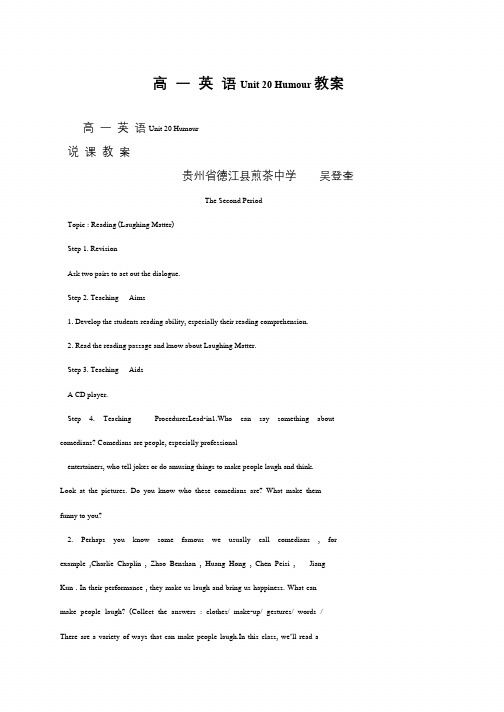
Stan Laurel,
while the stout one is calledOliver Hardy.) They are funny because they are each
thestoutoneOliverHardy.Theyarefunnybecausetheyareeachother’sopposites:
one fat and one thin; one is clever and one is silly etc.
2.Sample answers for Question 1
passage“LaughingMatter”).
Pre-reading
1.Doyouknowanycomediansbothathomeandabroad?Pleasename
some. Charlie Chaplin The
comicduoofthe1930s“LaurelandHardy”.ThethinoneiscalledStanLaurel,
Lookatthepictures.Doyouknowwhothesecomediansare?Whatmakethem
funny to you?
2.Perhapsyouknowsomefamousweusuallycallcomedians,for
example,CharlieChaplin,ZhaoBenshan,HuangHong,ChenPeisi,Jiang
whodressedupaswomenareforexample,DameEdna(Australia),MiltonBerle
高一英语教案:Unit20Humour
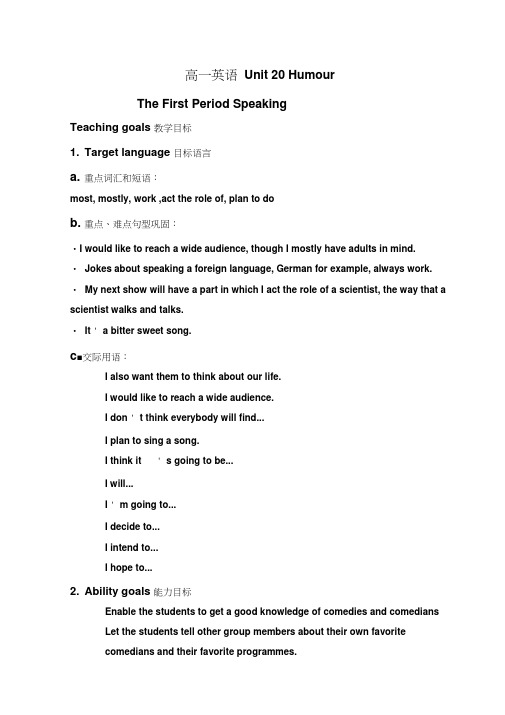
高一英语Unit 20 HumourThe First Period SpeakingTeaching goals 教学目标1. Target language 目标语言a. 重点词汇和短语:most, mostly, work ,act the role of, plan to dob. 重点、难点句型巩固:•I would like to reach a wide audience, though I mostly have adults in mind. •Jokes about speaking a foreign language, German for example, always work. •My next show will have a part in which I act the role of a scientist, the way that a scientist walks and talks.•It ' a bitter sweet song.c■交际用语:I also want them to think about our life.I would like to reach a wide audience.I don ' t think everybody will find...I plan to sing a song.I think it ' s going to be...I will...I ' m going to...I decide to...I intend to...I hope to...2. Ability goals 能力目标Enable the students to get a good knowledge of comedies and comediansLet the students tell other group members about their own favoritecomedians and their favorite programmes.Teaching important points 教学重点a. I would like to reach a wide audience, though I mostly have adults in mind.b. Jokes about speaking a foreign language, German for example, alwayswork.c. My next show will have a part in which I act the role of scientist, the waythat a scientist walks and talks.Teaching difficult points 教学难点Talk about humor and comedians in English.Teaching methods 教学方法1. Listen-and-response.2. Watch and say.3. Pair work/group work.4. Inducing method with questions and answers.Teaching aids教具准备1. Computer for macromedia use.2. Pictures.3. A tape recorder.Teaching procedures & ways 教学过程及方式Step I RevisionT: Hello, everyone. First, let 't s ranslate some sentencesto review the important sentences of Unit 19.T: 虽然他考试又没及格,但是他决不放弃。
最新外研高中英语优质课课件Unit20 Humour

Hale Waihona Puke The lady realized that he had not understood her correctly. What she meant was whether he would marry her and her husband. However their conversation put an
• 5. When did he ask her to marry him?
A few days later.
Retell the story
• There once was a minister who lived….
There once was a minister who lived three villages away from a young lady. One evening they had dinner together in a restaurant. They talked about people
• 3. How close to each 3.About eight other did the man and kilometres from the woman live? each other. • 4. Where did the woman ask thea minister to marry 4.In restaurant. her?
Comedy Clowns’ performance Comedians’ performance Crosstalk Joke Funny story……
Listening
Look at the pictures on page 50-51 then listen to the tape and number them.
- 1、下载文档前请自行甄别文档内容的完整性,平台不提供额外的编辑、内容补充、找答案等附加服务。
- 2、"仅部分预览"的文档,不可在线预览部分如存在完整性等问题,可反馈申请退款(可完整预览的文档不适用该条件!)。
- 3、如文档侵犯您的权益,请联系客服反馈,我们会尽快为您处理(人工客服工作时间:9:00-18:30)。
Unit 20 Humour 教案1Unit 20 Humour: 教案1 Ⅰ.Teaching Goals: 1.Talk about humour and comedians. 2.Practise saying tongue twisters. 3.Express intentions and plans. e the-ing form(1)as the Attribute and Object Complement. 5.Write a funny story or joke in English. Ⅱ.Teaching Time: Four periods Ⅲ.Background Information: One word or phrase may have two or more meanings;words or phrases which have different meanings may have the same or similar sounds.Words or phrases like these may sometimes cause confusion or ambiguity,but they also make it possible to joke or play on words for a humorous effect. For some reason English has one of the largest collections of jokes based on plays on words.These jokes are often in the form of a dialogue in which one person uses a word in one sense,which the other person understands it or deliberately interpretes it in a different sense.Here are some examples of the humorous dialogues.1.Policeman:You can’t park hero. Driver:Why not? Policeman:Read that sign. Driver:I did.It says,“Fine for parking”,so I parked.2.A:Where do you wash? B:In the spring. A:I didn’t ask when,I asked you where.3.Diana:How long will the next bus be? Charles:Oh,almost 45 feet.4.Dick:My aunt has 88 keys. Tracy:She must have a lot of doors. Dick:She doesn’t.She plays the piano.5.Customer:Is there any soup on the menu? Waiter:There was,but I wiped it off.6.Dick:Where are we eat tonight? Nick:Let’s eat up the street. Dick:Let’s not.I don’t like concrete.7.Professor:Name two pronouns. Student:Who,me?8.Teacher:Jimmy,what are the three words that students use most often at school? Jimmy:I don’t know…. Teacher:Correct. Plays on words can also be in the form of a riddle.And some riddles are plays on compound words.A compound word consists of two or more pants,and the pants do not havethe same meaning as they have when they are used separately,though they may keep their original sound.Here are some examples: (1)I work only when I’m fired.What am I ?(A rocket.) (2)I have teeth,but no mouth.What am I?(A comb.) (3)I have a mouth,but no teeth,what am I?(A river.) (4)Why does a river sleep a lot?(Because it is always in a bed.) (5)Why does a river have a lot of money?(Because it has two banks.) (6)If you throw a white stone into Red Sea,what will it become?(Wet.)(7)What can you see with your eyes shut?(A dream.) (8)Which runs faster,heat or cold?Why?(Heat.Because you can catch cold.)(9)I have cities but no houses;forests but no trees;rivers without water.What am I?(A map.) (10)What letter are people the most afraid of?(E.Because it’s the end of “life”.) (11)What kind of driver never needs a license?(A screwdriver.) (12)What kind of a nail should you not hit with a hammer?(Your fingernail.) Some jokes are based on words which have the same sound but different meanings and spellings.Jokes of this kind is better heard,not seen.When they are written or printed,the humor is largely lost.For example: Seven days without water makes one weak (week). We must all hang together or we shall all hang separately. The First Period Teaching Aims: 1.Practise saying tongue twisters. 2.Do some listening. 3.Talk about intentions and plans. 4.Learn and master the new words and expressions of this part. Teaching Important Points: 1.Improve the students' listening ability by listening. 2.Improve the students' speaking ability by making up dialogues. 3.Let the students master how to impress their intentions and plans. Teaching Difficult Points: 1.Make dialogues to express their ideas. 2.Say tongue twisters fluently. Teaching Methods: 1.Listening and speaking methods to improve the students' listening and speaking ability. 2.Pair work or group work tomake every student active in class activities. Teaching Aids: 1.a tape recorder 2.a projector and some slides 3.a computer for multimedia use Teaching Procedures: Step Ⅰ.Greetings and Revision T:Good morning,everyone. Ss:Good morning,teacher. T:Sit down,please.In the last period,I told you to make sentences with the expressions of Unit 19 and say them in groups.In this period,I'll ask some students to say their sentences again before class.Please listen to them carefully.Wang Fei,read your sentences,please. (Students listen carefully and help to correct the mistakes.) StepⅡ.Preparation for Listening and Speaking T:Today,we're going to learn a new unit Unit 20,Humour.(Teacher writes the following on the blackboard:Unit 20,Humour,the First Period.)From the title,we can guess that this unit will be much more interesting,for every one of us likes fun,and every fun makes us happy and gay.I hope you'll be interested in this unit.First,let's learn the new words and expressions of this period.Look at the screen. (Teacher shows the screen.) New words and expressions twister n.骗子,说慌的人;难事,难题tongue twister绕口令 bitter adj.苦的,痛苦的 couple n.(一)对;(一)双;夫妇 minister n.部长,大臣 humour n.(=humor)幽默,诙谐 humourous adj.富幽默感的,滑稽的 mostly adv.主要地,大部分,通常 laughter n.笑,笑声 tear n.眼泪 circus n.马戏团(场);杂技团(场) clown n.小丑,粗鲁愚蠢的人 intend vt.想要,打算,意指 intention n.意图,目的 Fred 佛瑞德(男名) T:Look at the first word:twister.Read after me:“twister”.(Read it twice),tongue twister….Do you know tongue twister?It means“a word or phrase difficult to speak quickly or correctly”.such as in Chinese“吃葡萄,吐葡萄皮,不吃葡萄,不吐葡萄皮”.In English,there are many twisters,too.In a while,let's read them.… (Teacher gives brief explanations to other words ifne cessary.) Step Ⅲ.Warming up T:Please open your books and turn to Page 39.Look at Warming up.Let's practise saying the following tongue twisters.First,read it slowly.Then read them faster and faster.You can read them to your partner.And let your partner see if there is any mistake in your reading.At last,I'll ask five students to read them before class to see who can speak faster without making mistakes,OK?let's begin. StepⅣ.Listening T:So much for warming up.Now we'll do listening.In the next period of time you will hear an interesting story.It is about a couple who got married.A child is asking her grandmother about her marriage.Number the pictures in the proper order.The first one has been done to help you.Please read the other two requirements to see what you will have to do after you finish listening.(After a few minutes.)Do you know about the things you'll do?(Ss:Yes.)During the period when you listen to the tape,I'll play it three times in all.When I play it for the first time,just listen.When I play it for the second time,do the exercises and you can check your answers to make sure they are right when I play the tape for the third time.Then check your answers with your classmates and tell your partner the story.Note that the beginning of the story has been given to you on Page 39.(At last,the teacher shows the pictures in the right order and the answers of Part 2 on the screen to get all the students to check and then asks a student to tell the story to the whole class.) Step Ⅴ.Speaking T:Now let's do speaking.First,please read a dialogue between ajournalist(j)and a comedian(c). T:(After students read the dialogue)What's the most important thing in a comedian's job? SA:The important thing in a comedian's job is not only to make people laugh,but also to get them to think about life. T:How many ways to make people laugh are given?What are they?Whatother examples can you give? SB:Two ways are given.They are:Jokes about speaking a foreign language and the way someone walks and talks.Other examples are:their make-up, the styles of their clothes,shoes and the way they hear something or see something etc. T:Please make a dialogue yourself.Pair work.One acts as the part of a journalist(j)and your partner acts as a circus clown(c).The dialogue you make should include the questions on Page 40.And you can use the expressions on the screen to help you.(Show the screen.)Later,we'll ask one pair to give us a performance.Let's begin. Useful expressions: I will…I'm going to… I intend to … I hope to… I plan/want to… I wish to… I've decided(not)to… I hope not to… Sample dialogue: J:For which age do you write your show? C:I mainly write my show for children.They're very interested in it.But a lot of adults like my show,too. J:What do you do as a clown? C:To make people laugh:We often don't use any words.It is our clothes,make-up and way we act that make people laugh.People laugh and they forget their problems for at least a moment. J:What are you doing at this moment? C:I'm getting ready for a performance with my partner.It's the funnest I've ever shown. J:What are your plans for your next show? C:I've written several shows.I intend to do them in the next few weeks.I hope to act them during the christmas holiday. J:How do you make children laugh? C:I make them laugh by movements.I copy Charlie Chaplin's movements in my performance.Childern laugh with tears. J:When will you stop working as a clown? C:As long as people especially children like me,I want to go on working until I'm very old.I like my job very much. J:Thank you very much. Step Ⅵ.Consolidation T:Now make another dialogue with your partner,using the expressions on the screen. Sample dialogue. (A:a journalist;B:a director) A:What are you doing at present?B:We're doing a comedy.It's really funny. A:What's your plan for the future? B:I've decided to do an opera.I would like to have a try in the opera. A:I hope it will be very successful.By the way,what do you enjoy doing most of all? B:Er…,it's a bit hard to say.I always intend to try something new. StepⅦ.Summary and H omework T:In this class,we've practised some tongue twisters and listened to a story.Then we've done some speaking practice.Above all,we should remember the useful expressions about how to express intentions and plans.What are they?They are…(The Design of the Writing on the Bb.Teacher and students say them aloud together.)Today's homework:1.Collect as many tongue twisters as possible;2.Make dialogues after class according to the situations given on the screen.(Teacher shows the screen.)That's all for this class.Class is over. Situation 1:This weekend you intend to see a film/watch a football match/visit a friend or some relatives.Or you plan to go shopping/go fishing/go sightseeing/go mountain-climbing etc. Situation 2:Suppose you have some special plans for New Year or for the winter holidays.You'd like to talk about it with your friend. Sample dialogues: Dialogue 1. A:Any plans for the weekend? B:I intend to go to the country to visit my grandparents. A:Your grandparents live a bit far away,don't they? B:Yes.It takes about two hours by bus. A:Are you going there alone? B:No.Since we haven't seen my grandparents for a long time,my parents and my uncle's family will go there together. A:So there would be a large family get-together this weekend.I think your grandparents will certainly be very happy! B:Of course they will. Dialogue 2: A:How do you plan to celebrate New Year,B? B:We have decided to give a comedy at New Year's party. A:Are you all ready for it? B:Not yet.But the play and the actors have been chosen.We are busy memorizing the linesof our own parts.Then we will practise where to stand,where to move,entrances and exits.I believe it will be terrific. A:I hope it will be a great success. Step Ⅷ.The Design of the Writing on the Blackboard Unit 20 Humour The First Period Useful expressions: I will… I'm going to… I intend to… I hope to… I plan/want to… I wish to… I've decided(not)to… I hope to… Step Ⅸ.Record after Teaching________________________________________________________________________________________________________________________优品课件,意犹未尽,知识共享,共创未来!!!。
